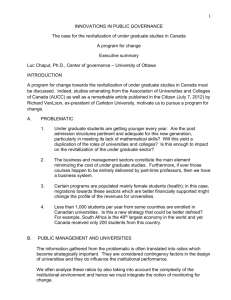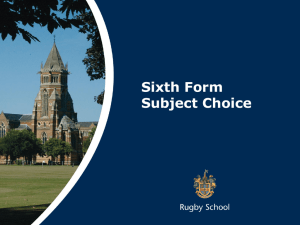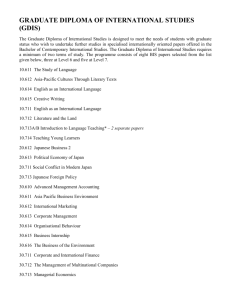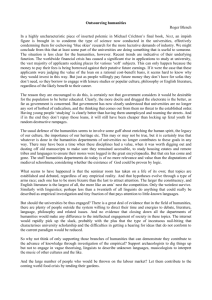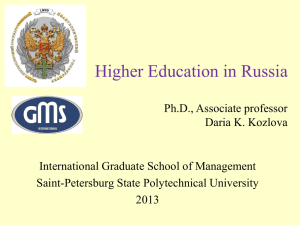Internet Education in English: Is Japan Finally Ready to Offer
advertisement
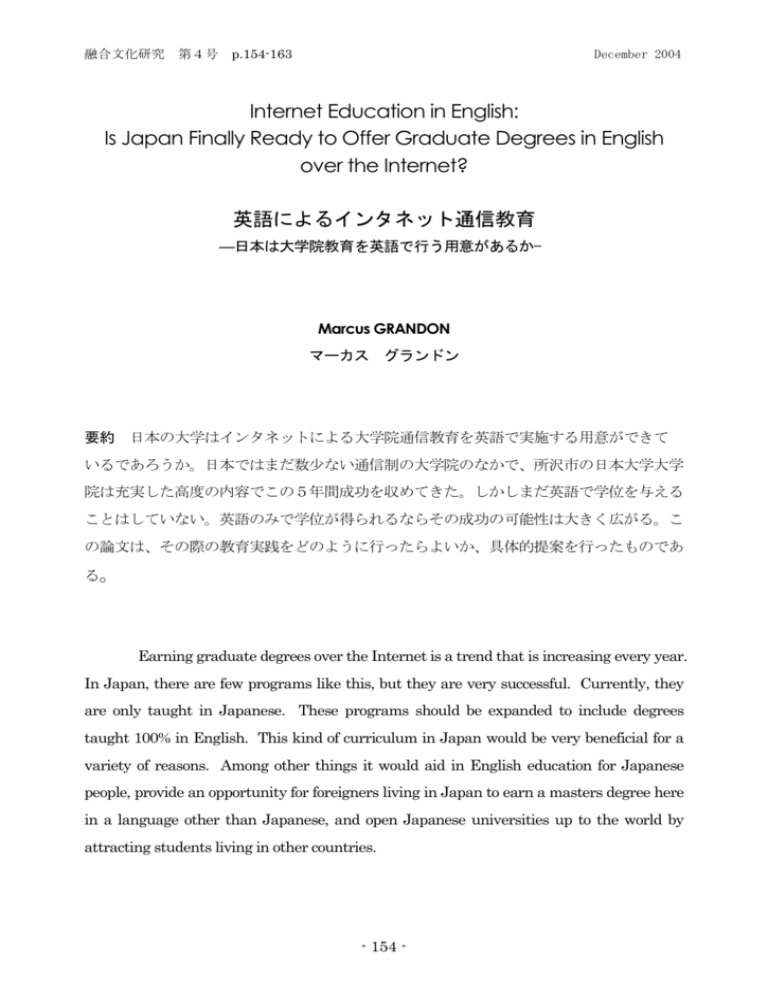
融合文化研究 第4号 p.154-163 December 2004 Internet Education in English: Is Japan Finally Ready to Offer Graduate Degrees in English over the Internet? 英語によるインタネット通信教育 ―日本は大学院教育を英語で行う用意があるか− Marcus GRANDON マーカス グランドン 要約 日本の大学はインタネットによる大学院通信教育を英語で実施する用意ができて いるであろうか。日本ではまだ数少ない通信制の大学院のなかで、所沢市の日本大学大学 院は充実した高度の内容でこの5年間成功を収めてきた。しかしまだ英語で学位を与える ことはしていない。英語のみで学位が得られるならその成功の可能性は大きく広がる。こ の論文は、その際の教育実践をどのように行ったらよいか、具体的提案を行ったものであ る。 Earning graduate degrees over the Internet is a trend that is increasing every year. In Japan, there are few programs like this, but they are very successful. Currently, they are only taught in Japanese. These programs should be expanded to include degrees taught 100% in English. This kind of curriculum in Japan would be very beneficial for a variety of reasons. Among other things it would aid in English education for Japanese people, provide an opportunity for foreigners living in Japan to earn a masters degree here in a language other than Japanese, and open Japanese universities up to the world by attracting students living in other countries. - 154 - マーカス グランドン 英語によるインタネット通信教育 For roughly the past 100 years, English education has been evolving in Japan. This process has undergone major changes throughout its development. Most recently, the biggest change has been advent of conversation and oral communication taking prominent positions beginning roughly 5 years ago. This seems to have been a very beneficial policy shift by the ministry of education. Perhaps the big question is what will happen next? Or, where does English education go from here? The Internet Giant is Awake Innovative ideas in not only English education, but also in education in general have been driving trends in education worldwide. The most important new trend is Internet study, with universities offering degrees at all levels - - undergraduate, Masters, and PhDs. This has been developing rapidly over the past decade. It is a natural outgrowth of distance education that has been being offered by premier universities over the past 100 years. There is no denying the success of undergraduate and graduate university degrees granted by universities as distance degrees, and there is no reason to think that Internet degrees will be any different. The Internet has already proven itself as a viable means distance learning. In fact, it is surely the best way distance education has been offered to date. E-mail, multi-media capability, research databases, among others things have made the Internet responsible for the single biggest recent development in education. In its current state, the Internet is just getting ready to be used in even better ways. As broadband increases, the potential for new uses becomes more available. Soon, Internet 2, a much more advanced and sophisticated usage of broadband will be extensively employed. Already huge movie files are being used for Internet instruction, pedagogical lessons are taking place in real time over high quality video conferencing, and the broadcast of high fidelity audio continues. These things will only become better and more prevalent. - 155 - 融合文化研究 第4号 p.154-163 December 2004 Japan’s Use of Internet Education Japan has been relatively slow to widely adopt the Internet as a means for earning a university degree. While distance education is no stranger to Japan, only few schools offer on-line degrees. Even fewer offer advanced graduate degrees. It can be said that Japan is lagging behind the world in the number of schools granting online degrees. There are Japanese universities offering degrees. One of the most successful Internet university programs in Japan is the Graduate School of Cultural and Communication Studies based at the Tokorozawa Campus of Nihon University (hereafter called Nichidai). It offers a variety of advanced degrees at the Masters level, and after 4 successful years, the program launched a PhD program over the Internet last year. The Nichidai program was designed to let working adults return to school without having to return to a campus, thereby letting the students keep their current jobs, and integrate the time demands required for advanced study into their lives. All of the professors in the program have extensive experience in their fields, and many are regarded as leaders in their area of expertise. Several hundred people have graduated from the program since its inception. The program of learning at the Nihon university graduate school is excellently designed. There are three major schools of study: Humanities, B, and C. The Masters requires a minimum of 2 years, with the PhD taking no less than three. Students have the ability to communicate with teachers easily over an online computer system only available to those enrolled in the program. Classes are designed in such a way that meeting with professors in person is rarely necessary, but teachers do make themselves available if students desire to visit the campus. In Addition, professors also create seminars several times a year at proximities located in different areas of Japan, giving those in different geographic locations the ability to study face-to-face with them. Mostly, it is a research based degree program, with research reports uploaded to the private Nichidai server, then read and graded by professors. - 156 - マーカス グランドン 英語によるインタネット通信教育 Currently, the Nichidai Program offers degrees only taught in the Japanese language. For students who want to learn English, there is one English writing class, but other than that there is no other choice. This is fine for Japanese students, but unfortunately excludes the rest of the world. Needed: Degrees Taught in English on the Net The success of such a program could be opened up to people from around the world. It seems that one possible way to expand the graduate program would be create a division where English is the language used to study. This is not to say that there should merely be several classes offered in English, but a whole degree program could be developed in English, where all of the reports for the entire degree are written in English, including all instruction, seminars, and even the final theses. A 100% English curriculum would be good for Nihon University for a number of reasons. Just as Japan opened itself up to modern ideas in the Meiji Period, most importantly, an English-only program would open up a Japanese university to the world. Universities in Japan are high quality institutions of learning with top professors and research facilities. The unfortunate thing about them is that they are only offered to Japanese people, or more specifically, only those with the ability to speak Japanese. A university with an English Internet program would let people from other places take advantage of the excellent learning opportunity provided by Japanese universities such as Nihon University. Furthermore, this would be a way for Nihon University to attract many different kinds of students. There are three main groups of people that would study in an English Internet program. The first group would be Japanese people who speak excellent English. There are many people in Japan who have the ability to complete a program in English, but do not have the chance to learn more. A program in English would help them improve their English, and also expose them to other kinds of worldly ideas. The program created - 157 - 融合文化研究 第4号 p.154-163 December 2004 would be in English, with English being one of the subjects of study, but it would also offer other subjects such as history, literature, philosophy and other humanities in English. Another group that would choose to study in English at a Japanese university would be native or other speakers of English living in Japan. As of now, there is no Internet graduate program at Japanese universities for those who wish to study only in English. The population of non-Japanese English speakers living in Japan is very high, and increasing all the time. An unusually high percentage of them have university level educations from their home countries. Many of these students desire to earn graduate degrees, but return to their home countries to get them, or study via the Internet, joining a university in the English speaking world. These same people would be attracted by the ability to study in the country in which they live. The third major group that would study in an English program over the Internet at a Japanese university are those from other countries that reside outside of Japan. Here lies potentially the greatest number of students. It would truly open up a Japanese university to the world. For example, Chinese English speakers in China would be able to choose a Japanese university. Unconfined by location, English speakers from all over the world would look to a program of this nature as one in which they could get a high level of education from a quality university. A university program like this in Japan would be the first of its kind in the country. By taking a step to build such a program, a university would be stepping into the future of education. It would be available to all English speakers in the world with an internet connection. The potential for students here is extremely immense. People could live anywhere. A program of this nature exists only in English speaking countries, and the time is ripe for this to start in non-English speaking countries, especially Japan, a country where English is such an important language. An example of a non-English country using English in their universities is Holland, where nearly all coursework is conducted in English, not Dutch. This has been in effect for over a decade now. Of course, there are already curriculums at major Japanese universities that - 158 - マーカス グランドン 英語によるインタネット通信教育 are taught entirely in English as immersion programs. English degrees over the internet are a logical next step. How to Create Such a Program It would seem that, in the beginning, the best curriculum to be taught in English is the humanities. A humanities department could be created within the university offering masters degrees in subjects such as literature, history, art, culture, English and philosophy. It would be best to model a new Internet program after one that is already successful in the world. Since universities from around the world are offering graduate degrees via the Internet, there are many excellent programs from which to choose. Topnotch English programs exist at top-level universities in England, the United States, and Australia and throughout the English-speaking world. It is most likely a strong idea to take best ideas existing in several places and combine them into one program, thereby creating a developed and mature program almost immediately. The strongest idea from Australia seems to be in the great emphasis that they put on studies in the humanities. The best online humanities degrees are offered by the University of Melbourne, and Deakin University. List other universities From England, one of the best point seems to be in the way universities there offer a program of study that culminates with diplomas and certificates for various levels of study. List other universities. Graduate programs in the United States are routinely ranked as the top in the world. There are several entire Internet graduate programs that adhere to the strict guidelines enforced by the American government’s renowned accreditation board. The best programs seem to those at California State University, Acapella University list everal - 159 - 融合文化研究 第4号 p.154-163 December 2004 others. Of these, California State University is by far the one with the longest history, number of graduates, and strongest in the humanities. The main portion of the Internet program should be modeled after the accredited Masters program at CSU, Deakin University in Australia, and the tiered system of education in Britain. This would provide opportunity for advanced study for the students based on the best of the best in the world, and combining it in such as way so as to make it the most advanced, developed, and evolved program of its kind in the world. The focus should be on making it not only the best graduate program in Japan, but also the best in the world. It should be an elite program that people truly desire to enter, and the produces graduates that are in the top class of the world. Specific Example of a Degree Program A master’s degree should be broken down into 3 main parts. There should be certain required classes that all students must pass in order to graduate. For the humanities, these can be extremely wide in scope, and taught by a variety of different teachers. The second part should be elective course work and guided independent study. This portion of the degree should weigh a little heavier in the program. Lastly, there should be a graduation thesis of final project. A breakdown could be as follows: 1. Required Humanities Courses 25% 2. Electives/Independent Study 55% 3. Thesis/Final Project 20% The required classes would be general humanities courses that insure that each student is versed in elements of liberal art spectrum. 4 or 5 courses should be designed in disciplines such as history, world literature, music theory, art, and philosophy. Of course, they would be taught at a high level required by graduate level work. - 160 - マーカス グランドン 英語によるインタネット通信教育 For the elective courses, various disciplinary and interdisciplinary courses could be offered based on specific topics. These would be taught by either current Japanese professors whose English is at a high enough ability, or by part-time teachers who are experts in their fields. There are even some American universities that pay a stipend to a teacher from another university to teach classes. This resembles part-time teaching at the graduate level. These professors at other universities are required to have the proper credentials from accredited universities, and essentially act as guest professors in the program. Many times the student even finds the professor, often an expert in their area of interest, and teaching full-time at another university. This guest-professor portion of the project shows the flexibility of the program, and would attract the interest of high quality professors and serious students. The thesis part of the program should be held up against the strictest academic requirements. It could include a traditional format of thesis writing, and also a more innovative approach whereby students take on a final research project. For the traditional format, it is simple to have the students learn how to present the work. The final research project is also a format being used by universities throughout the world at the moment. It is a newer idea than a traditional thesis, but a very effective way of presenting research writing. In both cases, a writing packet or kit could be made to provide the student guidelines necessary to complete a project of this magnitude. The program could be completed with periodic meetings with professors. At this time, progress could be reviewed and the students could be guided in necessary directions to ensure that they are on pace to complete their degree on timely basis. To review progress. Also professors could offer seminars so further deepen Borrowing from the British model, completion of each section of the program could lead to some sort of recognition. For example: Complete Required Courses – Certificate in Humanities - 161 - 融合文化研究 第4号 p.154-163 December 2004 Complete Electives – Diploma in Humanities Complete Thesis – Masters Degree in Humanities. This kind of recognition for each phase of the program provides incentives for students, and gives them something if they are unable to finish the entire program for any reason. Also, this creates interest in students, and many of them start programs like this and complete various phases over a longer period of time. Programs like this attract a great number of students because they know that they can complete shorter sections and still come away with feelings of accomplishment and recognition as well. A Japanese university such as Nihon University is best poised to develop an English-only graduate degree program. An Internet program has already been put in place there with everything necessary; servers, professors, IT people, and office workers. It would be a relatively smooth transition to create an English curriculum there since it is loaded with the proper resources, and has years of experience with online degree granting. Conclusion Internet classes and degrees from major universities have proliferated over the past decade. University degrees over the Internet in Japan are very rare, but those that exist are of very high quality. A good example of this is the program at Nihon University, which is offering degree programs at the Master’s and PhD level. There are no Internet degrees programs taught in English anywhere in Japan, so the time looks ripe for the creation of such a thing. An English program would benefit many kinds of people, and would open up Japanese universities to the world. The creation of such a degree program can be modeled after ideas based on other successful Internet degree programs at universities in the English speaking countries - 162 - マーカス グランドン 英語によるインタネット通信教育 Bibliography Bear, John & Mariah. Bears' Guide to Earning Degrees by Distance Learning,, Ten Speed Press, California, 2003. Feldenkrais, Moshe. Body and Mature Behavior. International Universities Press, Madison, 1949. Feldenkrais, Moshe. The Elusive Obvious. Meta Publications, California, 1981. Fogel, Alan. Developing Through Relationships. The University of Chicago Press, Chicago, 1991. Hirsch, E.D. Cultural Literacy. Vintage Books, New York, 1988, Ouspensky, P.D. In Serach of the Miraculous. Arkana, London, 1965. http://www.nihon-u.ac.jp/ http://www.csudh.edu/hux/ http://www.degree.net/ http://www.distance-educator.com/intro.htm http://www.detc.org/ http://distance-educator.com/ http://www.degreeinfo.com/ - 163 -

